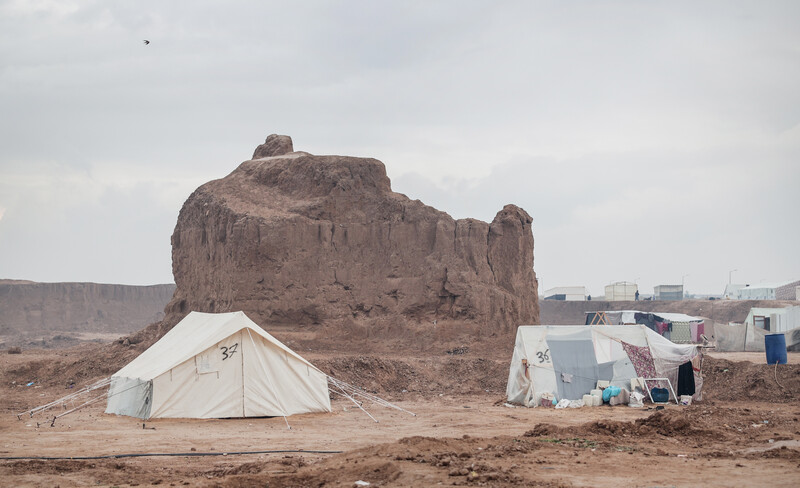The Electronic Intifada 4 January 2024

A view of a makeshift camp housing Palestinians forcibly displaced by Israeli attacks, in Rafah in the southern Gaza Strip, 2 January 2024. (Bashar Taleb / APA Images)
I was born in Gaza in July 1967, amid the Naksa, or setback. At this time, Israeli occupation forces imposed a blockade on Gaza and took control of more Palestinian lands.
A series of battles took place in Gaza City’s Shujaiya neighborhood, where my family lived. The occupation army used loudspeakers to threaten violence on anyone who left their home, so I was born without the aid of a doctor.
My father was my mother’s midwife, a judicious and caring presence.
Our family was originally from Majdal in historic Palestine. During the Nakba of 1948, the family was forcibly expelled to Gaza by Israel.
I was named Jalal – which roughly translates as “greatness” – in honor of my father.
He passed away when I was young and I began working to support my family.
In 1985, when I finished high school, I did not have the resources to enter university. I was a talented soccer player, though, and I was able to enroll in Bethlehem University on a scholarship.
I enjoyed my classes and scored high marks in English literature. But the Israeli occupation prevented me from realizing my dream of graduation.
I was imprisoned by Israel for four years, eight months and 20 days. My mother passed away 40 days before I was arrested.
Out of prison
Upon my release in 1992, I could not find work. The Israeli occupation prevented me from returning to university, as I was banned from leaving Gaza.
I opened a small restaurant and worked alongside my siblings. I got married, and we had three children: Yousef, Nader and Younes.
In 1998, I graduated from law school. I trained with the Palestine Bar Association for two years. Those years were difficult, and I was not paid.
But we were graced with the birth of a daughter, Wedad, whom we named after my mother.
My mother was the one who taught me patience and toughness.
I watched my children grow up, and I felt deep sadness that their grandmother was not there to see it.
I worked as a lawyer for a large company and specialized in conflict resolution. We were able to send our children to university and buy a more spacious home.
Two of my sons – Nader and Yousef – got married during 2023.
I was proud of my children, and I was happy in my life.
My first grandchild, Jalal
In October 2023, Israel demolished everything I had worked for in my life. My efforts and my dreams disintegrated before my eyes.
I only thank God for saving my family.
That month, I took my family to Khan Younis to protect ourselves from the occupation’s attacks.
Nader’s wife was pregnant, approaching nine months. She required medical care and a doctor’s attention, but she could not receive proper care due to the intense bombings.
Nevertheless, she remained steadfast. We were hesitant to go to a hospital because Israel was bombing them.
As her labor progressed, we grew increasingly concerned about the mother and the baby’s well-being.
Then, the day of birth came. We went to Nasser Medical Complex in Khan Younis.
The only vehicle we could find to take us to the hospital was a bread delivery van. The delivery man took us part of the way and the rest of the way we took a donkey-driven cart.
My son’s wife was in a panic. I reflected on my own birth during the Naksa and my mother’s strength during Israel’s attacks.
My grandson Jalal was born on 9 November 2023. He is my first grandchild and, like me, was also born in a time of war, blockade and displacement.
We cried tears of happiness when Jalal arrived into this world and when we knew his mother was safe.
A little over a month later, Israel attacked Nasser Medical Complex, killing displaced people and patients alike.
Ours is not the only story of migration and birth amid Israel’s attacks. There are so many more stories to tell but most of them will not be written.
They are too painful to tell and many of them end in death.
Jalal al-Hallaq lives in Gaza.


